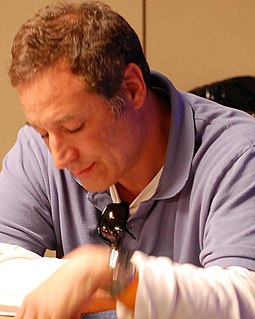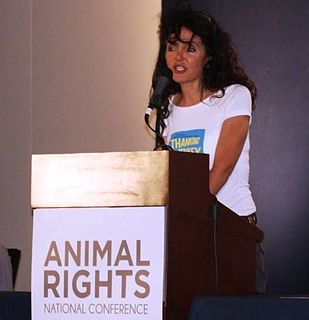A Quote by Gary L. Francione
Veganism is the application of the principle of abolition in your own life; it represents your recognition that animals are not things. Veganism is the recognition of the moral personhood of nonhuman animals.
Quote Topics
Related Quotes
The most important form of incremental change is the decision by the individual to become vegan. Veganism, or the eschewing of all animal products, is more than a matter of diet or lifestyle; it is a political and moral statement in which the individual accepts the principle of abolition in her own life. Veganism is the one truly abolitionist goal that we can all achieve - and we can achieve it immediately, starting with our next meal.
I find it very annoying that so many animal advocates talk about the difficulty of being vegan. Many animal advocates are inclined to make the issue their suffering and not the animals' suffering, and I suppose that accounts for part of the reason that veganism is portrayed as such a "sacrifice." And many animal advocates are not vegans, or are "flexible vegans," which means that they do not observe veganism at all or not consistently, and emphasizing the supposed difficulty of veganism is part of justifying their own behavior.
It is not your right—based on YOUR traditions, YOUR customs and YOUR habits—to deny animals THEIR freedom so you can harm them, enslave them and kill them. Thats not what rights are about. Thats injustice. There is no counter-argument to veganism. Accept it. Apologize for the way youve been living. Make amends and move forward.
The word "veganism" denotes a philosophy and way of living which seeks to exclude - as far as is possible and practical - all forms of exploitation of, and cruelty to, animals for food, clothing or any other purpose; and by extension, promotes the development and use of animal-free alternatives for the benefit of humans, animals and the environment. In dietary terms it denotes the practice of dispensing with all products derived wholly or partly from animals.
I have been a vegetarian for forty-two years. I did it because I didn't want animals to die so I could eat. Then, eight to ten years ago, when I found out the life of a dairy cow is way worse than the life of a beef cow, I understood I had to switch to complete veganism. Otherwise, I would be very inconsistent in my beliefs that animals shouldn't be abused for food.
There is increasing social concern about our use of nonhumans for experiments, food, clothing and entertainment. This concern about animals reflects both our own moral development as a civilization and our recognition that the differences between humans and animals are, for the most part, differences of degree and not of kind.
So far as this argument is concerned nonhuman animals and infants and retarded humans are in the same category; and if we use this argument to justify experiments on nonhuman animals we have to ask ourselves whether we are also prepared to allow experiments on human infants and retarded adults; and if we make a distinction between animals and these humans, on what basis can we do it, other than a bare-faced - and morally indefensible - preference for members of our own species?
Some people feel that humans have a right to eat other animals but not to trash the earth. They may choose veganism because a vegan's ecological footprint is light, but once they are not invested in eating animals, they are more likely to be willing to learn the details of what happens to them. That learning will encourage compassionate people to stick with a plant-based diet.
If animals are no longer quite outside the moral sphere, they are still in a special section near the outer rim. Their interests are allowed to count only when they do not clash with human interests. If there is a clash - even a clash between a lifetime of suffering for a nonhuman animal and the gastronomic preference of a human being - the interests of the nonhuman are disregarded. The moral attitudes of the past are too deeply embedded in our thought and our practices to be upset by a mere change in our knowledge of ourselves and of other animals.




























